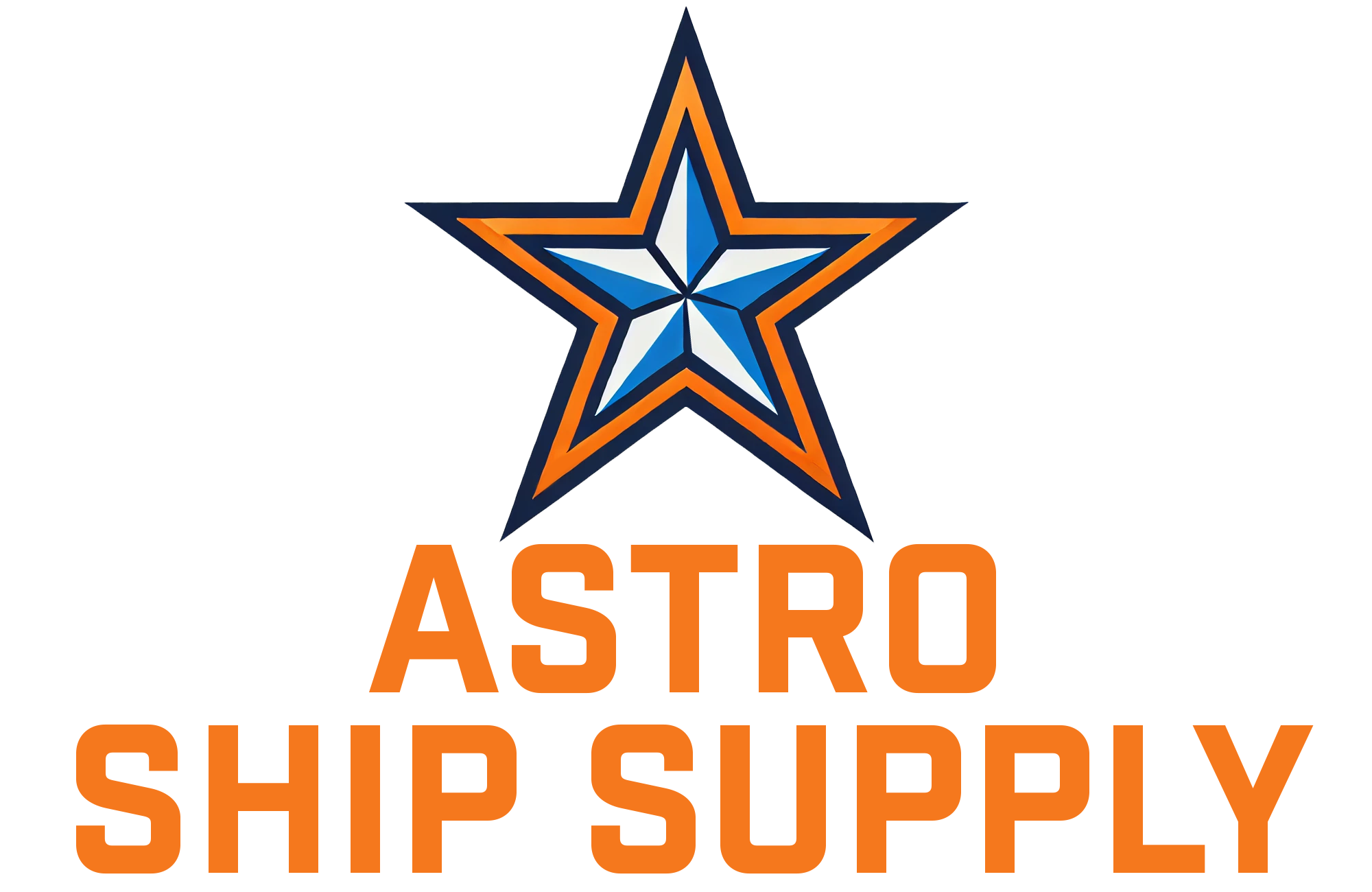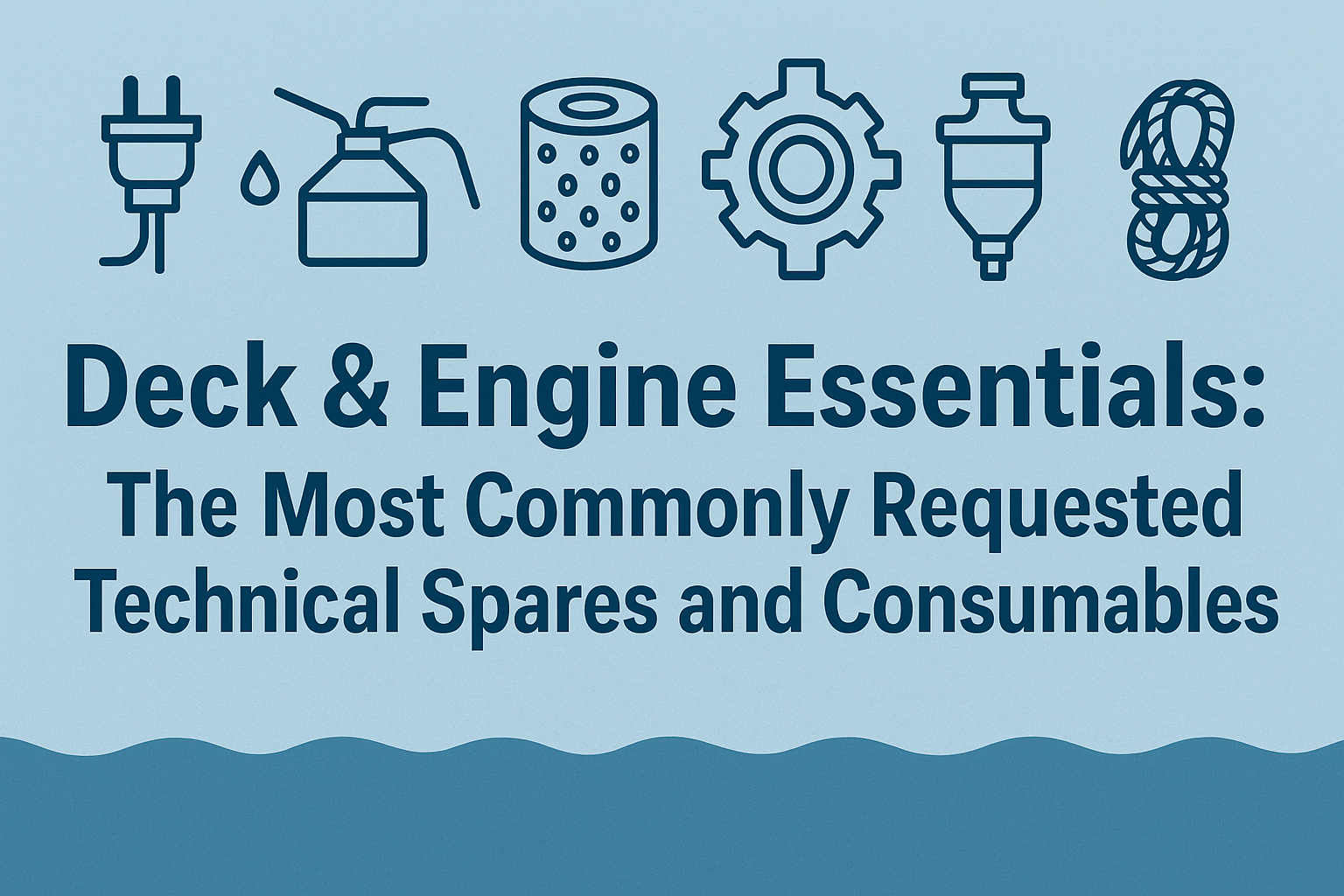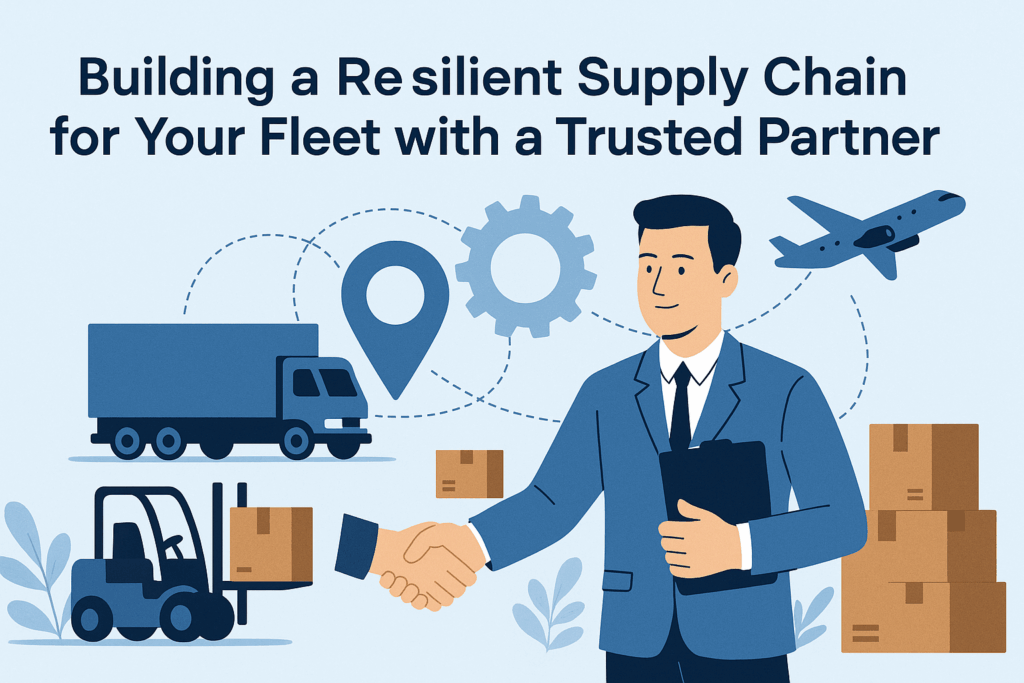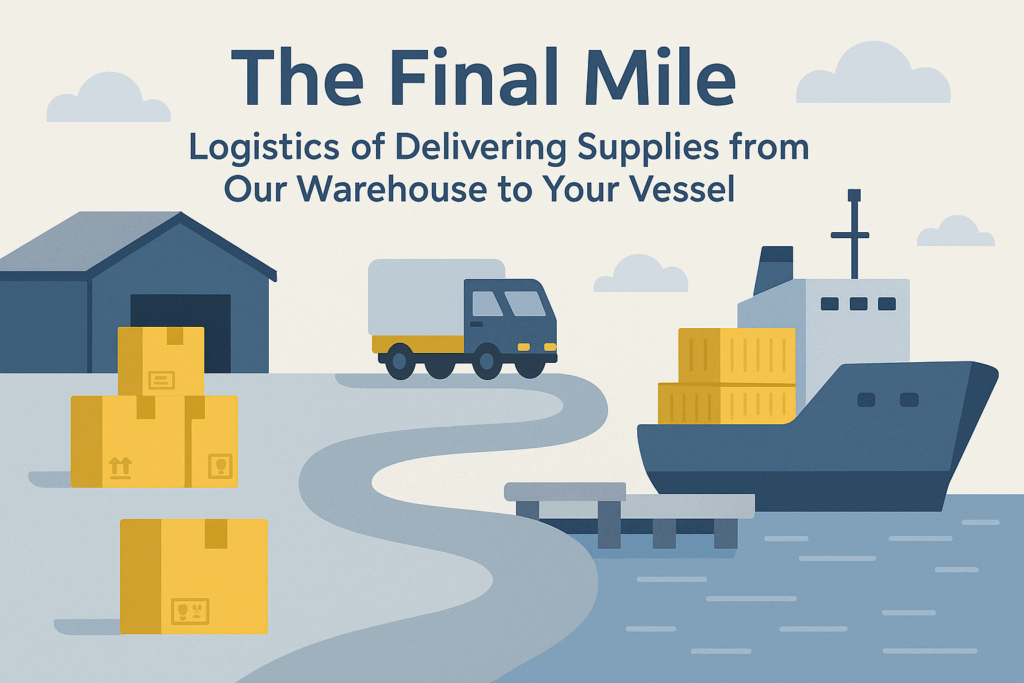The intricate machinery that powers a ship, from its massive engines to its sophisticated navigation systems, requires constant maintenance, repair, and replenishment. A single overlooked component can lead to costly delays, operational hazards, and even regulatory non-compliance. Therefore, a proactive approach to managing your vessel’s technical inventory is paramount. But what exactly constitutes “deck and engine essentials,” and how can you ensure your vessel is always stocked with precisely what it needs?
Understanding Deck & Engine Essentials: A Dual Perspective
To truly grasp the scope of technical spares and consumables, it’s helpful to categorize them based on their primary operational area: the deck and the engine room. While both are integral to a vessel’s functionality, their specific needs and the types of items they consume differ significantly.
Deck Department: Navigating the Surface and Beyond
The deck department is responsible for the vessel’s exterior, navigation, cargo operations, safety equipment, and general maintenance. The demands on this department are diverse, ranging from routine cleaning to complex mooring operations. Consequently, the technical spares and consumables for the deck are equally varied.
Top Requested Deck Spares & Consumables:
- Ropes and Hawsers: Essential for mooring, towing, and various on-deck operations. This includes synthetic ropes (e.g., polypropylene, nylon, polyester), wire ropes, and natural fiber ropes. Different types offer varying strengths, elasticity, and resistance to environmental factors.
- Mooring Equipment: Fenders (pneumatic, foam-filled, or rubber), shackles, kenter links, and chocks are crucial for safe berthing and unberthing.
- Navigation & Communication Spares: While often specialized, common consumables include navigation light bulbs, spare parts for radar and GPS systems (e.g., fuses, certain sensors), and communication equipment accessories (e.g., antennas, cables).
- Safety & Lifesaving Equipment Spares: Replacement parts for lifeboats (e.g., engine parts, release hooks), liferafts (e.g., CO2 cylinders, repair kits), fire-fighting equipment (e.g., hose couplings, nozzles, fire extinguisher refills), and personal protective equipment (PPE) like helmets, safety shoes, and gloves.
- Painting & Anti-Corrosion Supplies: A constant need on any vessel. This includes various types of marine paints (anti-fouling, primer, topcoat), thinners, brushes, rollers, sandpapers, and rust removers. Regular painting protects the hull and superstructure from the harsh marine environment.
- Cleaning & Maintenance Supplies: Industrial degreasers, detergents, specialized cleaning agents for different surfaces, brushes, mops, rags, and high-pressure washing equipment spares.
- Cargo Gear Spares: For vessels involved in cargo operations, spares for cranes, winches, derricks, and hatch covers are vital. This can include hydraulic hoses, seals, filters, and electrical components.
- Pipes & Fittings: A wide array of pipes (steel, copper, PVC), valves (gate, globe, butterfly), flanges, gaskets, and various fittings are always in demand for repairs to pipelines carrying water, fuel, or other liquids.
- General Tools: An assortment of hand tools (wrenches, hammers, screwdrivers), power tools (drills, grinders), and their respective consumables (drill bits, grinding discs).
For more detailed information on specific deck needs, explore our Deck Supplies & Equipment services.
Engine Room: The Heartbeat of the Vessel
The engine room is the nerve center of the ship, housing the main propulsion system, generators, pumps, purifiers, and a complex network of ancillary machinery. The items requested here are typically more specialized, focusing on the maintenance and repair of mechanical, electrical, and hydraulic systems.
Most Commonly Requested Engine Spares & Consumables:
- Filters: Arguably the most frequently replaced consumable in the engine room. This includes fuel filters, oil filters (lubricating oil, hydraulic oil), air filters for engines and ventilation systems, and water filters. Regular replacement is crucial for preventing contaminants from damaging machinery.
- Lubricants & Oils: Various types of engine oils, hydraulic oils, gear oils, greases, and specialized lubricants are continuously consumed to ensure the smooth operation and longevity of moving parts.
- Gaskets & Seals: Essential for preventing leaks in pipelines, engines, pumps, and other machinery. A vast array of materials and sizes are required, from engine cylinder head gaskets to O-rings for hydraulic systems.
- Bearings: Crucial components in rotating machinery like pumps, motors, and generators. Various types, including ball bearings, roller bearings, and plain bearings, are commonly requested spares.
- Valves: Similar to deck requirements, but with a focus on types used in engine systems, such as relief valves, control valves, and check valves for fuel, oil, and water lines.
- Pipes & Hoses: High-pressure hoses for hydraulic systems, flexible hoses for fuel and oil lines, and various metallic pipes for conveying fluids throughout the engine room.
- Electrical Components: Fuses, circuit breakers, relays, contactors, various types of cables, and light bulbs for the engine room lighting.
- Pumps & Pump Spares: Impellers, mechanical seals, shafts, and bearings for various types of pumps (cooling water pumps, fuel transfer pumps, bilge pumps).
- Engine Spares (General): While highly specific to engine type, commonly requested generic items include fuel injectors, nozzles, piston rings, cylinder liners (less frequent but critical), and connecting rod bearings.
- Chemicals: Cleaning chemicals for fuel and oil tanks, water treatment chemicals for boilers and cooling systems, and various solvents.
For a comprehensive list of engine room necessities, consider our specialized Provisions & Food Supply services, which often go hand-in-hand with technical deliveries to optimize logistics.
—
Case Studies: The Impact of Smart Spares Management
Proactive and efficient management of deck and engine essentials can significantly impact a vessel’s operational efficiency and cost-effectiveness. Let’s examine a few scenarios:
Case Study 1: The Unexpected Pump Failure
A bulk carrier, en route from Houston to Rotterdam, experienced an unexpected failure of its main seawater cooling pump. Without immediate replacement, the vessel faced a critical shutdown, potentially leading to thousands of dollars in off-hire costs and schedule disruptions. Fortunately, the vessel’s procurement manager had previously collaborated with Astro Ship Supply to identify critical spares for all essential machinery, including a spare seawater pump and a complete set of gaskets and seals. Within hours of the breakdown, the necessary parts were dispatched from our Houston warehouse to the nearest accessible port, enabling a rapid repair and minimizing downtime. This scenario highlights the importance of having a well-defined critical spares list and a reliable supply partner.
Case Study 2: Optimized Inventory for a Fleet of Tankers
A major tanker operator with a fleet of ten vessels faced challenges in managing their consumables inventory. Inconsistent ordering practices led to either overstocking (tying up capital) or understocking (risking delays). Astro Ship Supply worked with the operator to analyze their historical consumption data for items like filters, lubricants, and cleaning supplies. By implementing a demand-driven inventory management system and consolidating orders through a single, reliable chandlery, the operator reduced their on-board inventory by 15% while simultaneously improving part availability. This not only freed up capital but also streamlined their logistical operations, reducing administrative overhead.
—
Comparative Analysis: In-House Procurement vs. Ship Chandlery Partnership
When it comes to sourcing technical spares and consumables, ship owners and operators typically have two primary approaches: managing procurement in-house or partnering with a dedicated ship chandlery. Each approach has its merits and drawbacks.
| Feature | In-House Procurement | Ship Chandlery Partnership (e.g., Astro Ship Supply) |
|---|---|---|
| Expertise & Product Knowledge | Requires dedicated internal staff with deep knowledge of maritime equipment and supplier networks. | Leverages specialized expertise of the chandlery, ensuring correct part identification and sourcing. |
| Supplier Network | Building and maintaining relationships with numerous individual manufacturers and suppliers. | Established relationships with a vast network of global and local suppliers, access to diverse products. |
| Logistics & Delivery | Managing warehousing, transportation, customs clearance, and last-mile delivery to the vessel. | Chandlery handles all logistics, including storage, consolidation, customs, and timely port delivery. |
| Cost Efficiency | Potential for bulk discounts but high administrative overhead and risk of holding excess inventory. | Often achieves better pricing through bulk purchasing, reduced administrative costs, and optimized inventory. |
| Response Time for Emergencies | Can be slow if parts are not readily available or require international shipping. | Rapid response capabilities, especially for critical spares, leveraging local stock and expedited delivery. |
| Compliance & Quality Control | Responsibility for ensuring all purchased items meet maritime standards and certifications. | Chandlery ensures compliance (e.g., ISO 9001:2015, HACCP) and maintains strict quality control. |
| Focus on Core Business | Diversion of internal resources to procurement and logistics, away from core operational tasks. | Allows ship operators to focus on their primary business, offloading procurement complexities. |
While in-house procurement offers greater direct control, partnering with a reputable ship chandlery like Astro Ship Supply often translates into significant cost savings, improved efficiency, and reduced operational risk, particularly in dynamic port environments like Houston.
—
Optimizing Your Technical Spares Inventory: Best Practices
Effective management of your vessel’s technical spares and consumables inventory is a continuous process. Here are some best practices to consider:
H3.1. Implement a Robust Inventory Management System
Whether it’s a sophisticated software solution or a meticulously maintained spreadsheet, having an accurate record of your on-board inventory, minimum stock levels, reorder points, and supplier information is crucial. This helps prevent stockouts and overstocking.
H3.2. Conduct Regular Audits & Condition Monitoring
Periodically inspect your spares inventory for damage, expiry dates (for chemicals and certain safety items), and proper storage. Condition monitoring of critical machinery can also help predict part failures and allow for proactive ordering.
H3.3. Standardize Where Possible
For fleet operators, standardizing components and consumables across vessels (where feasible) can simplify procurement, reduce the variety of spares needed, and potentially lead to better bulk pricing. This can be particularly effective for Cabin & Accommodation supplies as well.
H3.4. Leverage Data Analytics
Analyze historical consumption data to identify trends, forecast future needs, and optimize ordering schedules. This data-driven approach can significantly reduce waste and improve efficiency.
H3.5. Partner with a Reliable Ship Chandlery
A trusted chandlery acts as an extension of your procurement team, offering expertise, a vast supplier network, logistical support, and rapid response capabilities. They can help identify suitable replacements, offer competitive pricing, and ensure timely delivery. Astro Ship Supply, with our certifications including ISO 9001:2015 and HACCP, embodies this reliability and commitment to quality.
—
Beyond the Basics: Specialized Technical Spares
While we’ve covered the most commonly requested items, it’s important to remember that some vessels, depending on their type and operation, may require highly specialized technical spares. This includes items for:
- Refrigeration Systems: Compressors, condensers, evaporators, refrigerants, and control components for reefer vessels or those with extensive cold storage.
- Boiler Systems: Tubes, refractory materials, safety valves, and control systems for vessels relying on steam power or heating.
- Automation & Control Systems: PCBs, sensors, actuators, and software licenses for modern, highly automated vessels.
- Specialized Cargo Handling Equipment: Unique spares for specific cargo types, such as LNG carriers, chemical tankers, or heavy-lift vessels.
A comprehensive ship chandlery will have the network and expertise to source even these niche items, ensuring your specialized vessel remains fully operational.
—
The Astro Ship Supply Advantage: Your Partner in Technical Procurement
At Astro Ship Supply, we understand the complexities of maritime logistics and the critical importance of timely, accurate, and quality-assured technical supplies. Our commitment to excellence is reflected in our adherence to rigorous standards, including ISO 9001:2015 for Quality Management and HACCP for Food Safety, alongside compliance with the International Ship and Port Facility Security (ISPS) Code and U.S. Customs and Border Protection requirements. We don’t just deliver parts; we deliver peace of mind.
Our dedicated team provides 24/7 support, ensuring that whether you need a common filter or a specialized engine component, we are ready to respond. We maintain strict quality controls throughout our Texas-based supply chain, ensuring every item meets maritime standards. From Bonded Stores to intricate engine parts, we are Houston’s premier ship chandlery and supply service.
Don’t let a missing part jeopardize your voyage. Request a quote today and experience the Astro Ship Supply difference – where trust meets quality, and excellence is delivered in every shipment.
—
FAQ: Your Questions Answered on Deck & Engine Essentials
- What is the difference between “technical spares” and “consumables”?
- Technical spares are replacement parts designed to repair or replace a broken component of a machinery or system (e.g., a pump impeller, an engine piston ring). They are typically used for specific repairs. Consumables, on the other hand, are items that are regularly used up or depleted during normal operation and require frequent replenishment (e.g., filters, lubricants, cleaning chemicals). While both are essential, spares are for unexpected repairs or planned maintenance, while consumables are for routine operational needs.
- How can I ensure the quality of technical spares I procure?
- To ensure quality, always procure from reputable suppliers and ship chandleries that adhere to international quality standards (like ISO 9001:2015). Request original equipment manufacturer (OEM) parts where possible, or reputable aftermarket alternatives. Check for relevant certifications and ensure proper documentation is provided with each delivery. A reliable chandlery will have strict quality control processes in place.
- What are some common challenges in managing technical spares inventory on a vessel?
- Common challenges include accurate forecasting of demand, limited storage space on board, risk of obsolescence for older vessels, ensuring correct part identification, managing customs and import regulations for international deliveries, and maintaining proper preservation of spares in the marine environment. Partnering with an experienced ship chandlery can alleviate many of these challenges.
- Why is timely delivery of technical spares so crucial?
- Timely delivery is paramount because delays can lead to significant financial losses due to off-hire time, missed schedules, and penalties. More importantly, it can compromise the safety of the vessel and crew if critical equipment cannot be repaired promptly. A vessel stuck in port awaiting a part is a costly and inefficient scenario.
- How does Astro Ship Supply handle urgent or emergency technical spare requests?
- At Astro Ship Supply, we understand the urgency of emergency situations. We offer 24/7 support via email, text, or phone. Our extensive network of suppliers and strategic location in the Port of Houston allow us to rapidly source and dispatch critical spares with expedited delivery options, minimizing your vessel’s downtime. Our team is trained to quickly identify, locate, and deliver the required parts, even under tight deadlines.






